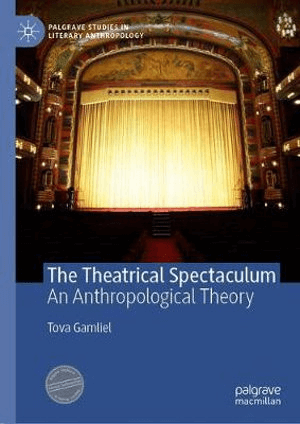הספקטרום התיאטרלי – ספר חדש לטובה גמליאל
ברכות לטובה גמליאל, פרופ' לאנתרופולוגיה מבר-אילן, על פרסום ספרה The Theatrical Spectaculum בהוצאת Palgrave Macmillan.
הספר הוא מסה אנתרופולוגית המציעה פרספקטיבה מיתית לבחינת חידת כוח הפיתוי והשרידות של מוסד ארכאי-עכשווי – התיאטרון המערבי, כאשר במוקד המסה עומדת תיאוריית הספקטקולום.
ראו בהמשך גם את הקדמה שכתב ג'פרי אלכסנדר לספר
עוד על הספר:
ספקטקולום הוא ממד תיאטרלי א-דרמטי בעל שלושה מובנים השלובים זה בזה, קוסמולוגי, ריטואלי וסוציולוגי. במובנו הקוסמו-לוגי הספקטקולום הוא תודעה מונותאיסטית יהודית-נוצרית על אי-מקריות, סדר מופתי ואתי של העולם הנגלה החברתי והלא-חברתי, הנתפס בחושים (כמו הספקטקל התיאטרוני). מובנו הריטואלי הוא היותו אלמנט מרכזי בתיאטרון המערבי, שהפקותיו החוזרות בפני קהל משחזרת אירוע מיתי התגלותי, חד-פעמי ופרדיגמטי – מעמד הר-סיני. מובנו החברתי הוא כל תיאוריה/אידיאולוגיה חברתית כריזמטית המעוגנת בסטרוקטורה מובהקת של ריבונות חברתית – במה-קהל – כפי שמציעים התיאטרון והמיתוס.
המסה מתפתחת במתווה ייחודי של 'טקסטואליות-של-ביקור', המזמינה את דמיון הקוראים לנוע לולאתית מרחבת המבואה החיצונית לבניין התיאטרון דרך חלליו השונים, ובחזרה אל המבואה המובילה אל הרחוב העירוני. המחזה "אלוף הבונים" של איבסן זוכה לניתוח מורחב שכל כוונתו לתמוך באופציית השלילה שלו עצמו, כלומר בחוויה תיאטרונית א-דרמטית.
המסה דנה בהשתמעויות הסוציו-פוליטיות ההיסטוריות והאקטואליות של סטרוקטורת ה"קופסאות" של המיתוס והתיאטרון המערבי ("קופסא גדולה" – קהל "קופסא קטנה" – במה) ותחבולות כוח אחרות. היא עומדת על הזיקה בין אתיקת הדיוק בעבודת השחקן, השואפת למיזוג (fusion) בובריאני בינו לבין הדמות, הפרטנר והקהל, לבין מובנו החברתי-אוטופי הסמוי של הספקטקל. ניתוח דקדקני של הבניית העולם הבימתי במסגרת סטרוקטורת הריבונות, זו הפרדיגמטית לתיאטרון, ממגר את הדימוי שדבק בתיאטרון כמחוז של בדותה, ומנהיר את עבודת האמת הפולחנית המגולמת בו. התגלות האמת הקוסמולוגית והאתית לעיני צופי התיאטרון היא מבעד לספקטקל, בתווך, בינות לחללים שבין הדמויות והדברים, ומעל ומעבר לנשמת התיאטרון, הלא היא העלילה הדרמטית.
בעידן של אובדן סמכות וניהיליזם ערכי, התיאטרון הוא מחוז לצליינות של ממש, המוותרת לרגע על הספקטקל הוירטואלי לטובת הריטואלי. במונחיו של הסוציולוג התרבותי פיליפ ריף, המדובר בבחירה המתקיימת עדיין בין "קהילות שליליות" של הסייבר ספייס ל"תרבות החיובית" של התיאטרון. עד לסוף המסה מונהרת חידת התמדת המוסד הארכאי-עכשווי נוכח זהות הסייבר-סובייקט וההיפר-מדיה לו נתונים בני ובנות זמננו.
מטענו הסמלי הלא מודע של ההר המיתי בחוויה התיאטרונית מהווה רקע לכמה היפוכים מחשבתיים. אחד היפים בהם נוגע לאקט ההשתחוויה הניטל מהשחקנים ומשוייך לקהל.
ראו גם את ההקדמה שכתב ג'פרי אלכסנדר, פרופ' לסוציולוגיה מייל, לספרה של גמליאל:
In what follows, Tova Gamliel provides a stirring and profound meditation on the feeling of drama. It is written in a layered, complex, archeological prose that is Jamesian, moving upward and downward, back and forth, from abstraction and intellectualism to banal interviews with actors, observations of audiences, and dictates of directors. As with James, the effect of Gamliel’s intimate, subtle, implicative prose is to create a sense of the ultimate, of transcendence and its secular mystery, of a deep layer of sensation and metaphysical awareness underneath the prose. It as if reading itself provides an experience of the spectaculum, the experience that Gamliel posits as the ultimate ground base of theatre as compared to reading.
What follows is an anthropological essay. It is personal and metaphorical, and often theological. Yet, it is also filled to the brim, indeed generated by, years of intense fieldwork and minute empirical observation and interview.
Gamliel finds that actors view their actions as efforts to enact truthfulness. They strive to create an existential authenticity, the only sacred meaning possible in modern times, a sacrality stripped of metaphysics. As they seek to practice the art of bare honesty, actors purge themselves and their audiences of the performative pollution of modern life. “Authenticity has happened” is how an actor relates to Gamliel his performative success.
Not just actors but theatrical writers, directors, and technical staff aim to allow audiences to experience transcendence as if they were in the traditional world of the ancient Jews who received the Godly revelation on Mount Sanai. The Ten Commandments, the ethical backdrop of western civilization, could never have passed to posterity if God had not scripted and Moses had not directed the sacral presence. Bubers’ I-thou, a work that grows from but also goes beyond modern Jewish theology, translates the dramatic experience of transcendence at Mt. Sanai, performing the sacred that is modern acting.
It is not the theatrical text, theological or secular, but the experience of the darkened theatre and the blaze of arc light that illuminate emotions and meanings of actors on the stage, and create the experience of theatrical sacredness. One can become alienated from a theatrical text, but not from the experience of theatre. This is why the ethical survives at the center of drama, no matter postmodern critique. Theatre is Barthes’ “third,” the oblique experience outside of the text that is phenomenological, inchoate, and primordial, a sensation of the other that warrants the suspension of disbelief.


